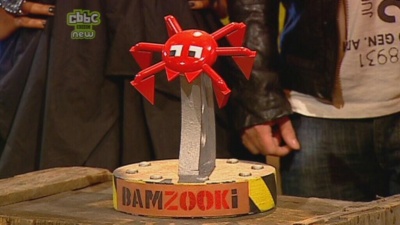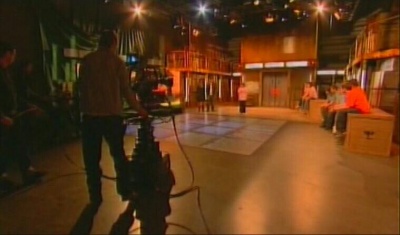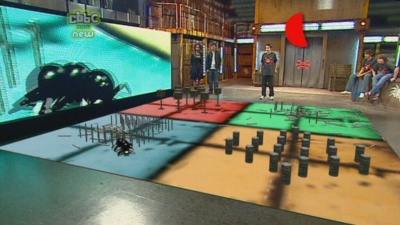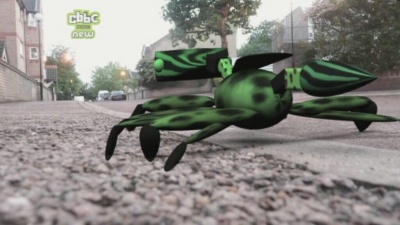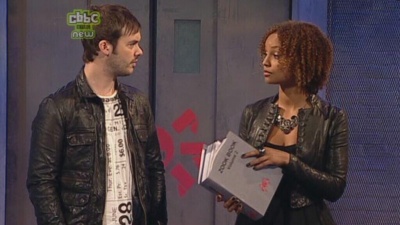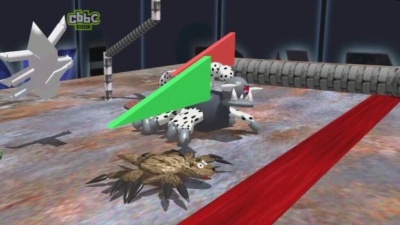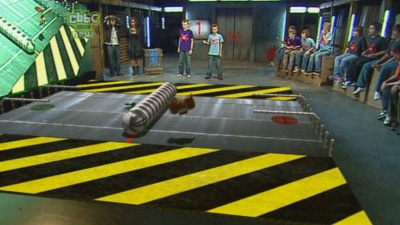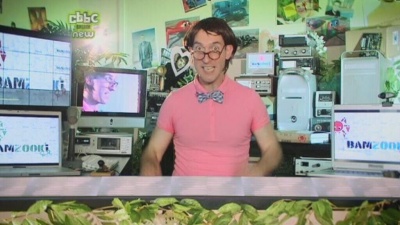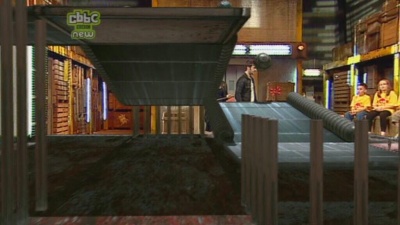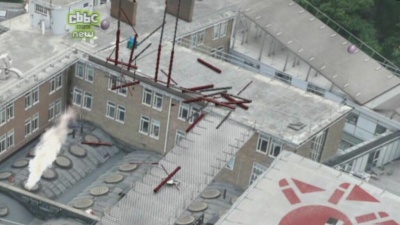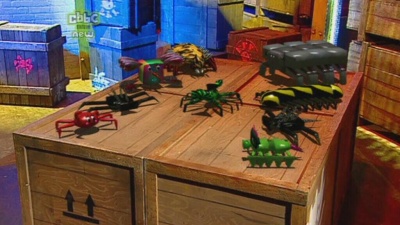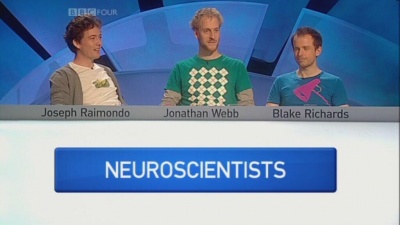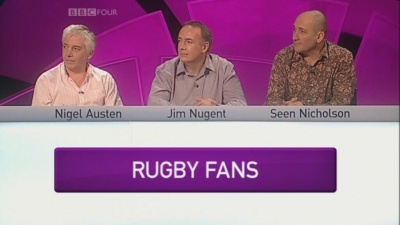Weaver's Week 2010-02-07
Last week | Weaver's Week Index | Next week
This week, we've mostly been over-indexing on tweenaged robot designers looking for fights, victory, and to have their creations step out with the lovely Mimi.
Contents |
Bamzooki
CBBC, 11 November 2009 – 3 February 2010
In the beginning, the BBC created a virtual studio, a place where real people and computer-generated graphics could come together. It really is jolly clever: each camera looks at a grid on the studio ceiling to find its position and orientation in the room. The camera also has its own PC to build the virtual scene from its point of view, judged from what it can see of the grid on the ceiling. The actual scene is generated in realtime from another computer, which talks to the computers on the cameras. So each camera has two views: what it sees in real life, and what it should be seeing from that place if the virtual world were present.
Then some more machines combine the real video with the virtual video to provide a realtime composite video stream. Not only is this recorded (and edited) digitally, it's shown on monitors in the studio. The camerapeople can see what they're virtually (and really) filming, the director can make a judicious choice of shots, and the studio participants can see what's happening. We'll be honest, we don't fully understand this ourselves, but the BBC Studios explanation might help.
For many years, this virtual studio technology was monopolised by the News Department. They didn't exactly use the technology to help tell a story, and virtuality for virtuality's sake reached a nadir in the local election coverage of 2007. Tony Blair served tennis balls into a net (to represent the decline of Labour's vote), the various Conservative leaders evolved from simian to Cameron (representing that party's increased share of the vote, apparently), and Ming Campbell jigged about to some hip-hop beat (for no other reason than they could.)
We've not been able to find any evidence of these crimes against reason on the BBC website, but the equivalent night in 2008 was little better. It featured Jeremy Vine putting on the worst cowboy accent in recorded history, and a virtual Nick Clegg pointing his gun at tin cans. It didn't even make sense for people returning from the pub! These lowlights are preserved for posterity at the BBC news website, though we caution that they may not be suitable for viewers of any disposition, because they're really, really bad. No, really, worse than that. If you have jaws, be prepared to go down to the basement to retrieve them when they drop. Jeremy's brother could do better. A child of ten could do better.
And, goodness, a child of ten did do better. As did some children of eleven, twelve, and nine. And other ages. They all went off to the BBC website, downloaded a zook kit, built their own fighting creation (more legs were better, more outlandish decorations were really good), and competed against each other. Some of the most successful zooks – and their creators – were invited to the BBC studios, where their zooks would battle against each other, in a quest to be crowned the Ultimate Zook, the Best Zook in Britain. It's a gateway to fame! Fortune! Untold riches! And, if they're not careful, infamy and a swift descent into obscurity, culminating in a spot on Celebrity Zook Brother in a few years' time.
We get ahead of ourselves. The programmes all followed a similar format. There's an opening street race, in which the zooks try to get from the start line to Bamzooki HQ first. Then there are some head-to-head battles, a time trial, and the last two zooks race again on the rooftops of the BBC studios. The winners come back to do it again in the semi-finals, and the winners make it to the final.
But Bamzooki is much more than that. Take the opening sequence, in which host Barney Harwood adopts a cunning disguise complete with mask, only to (literally) rip his face off and set out the race. A voice-over suggests that Bamzooki is a secretive organisation, and the authorities believe it to be dangerous. The show will go on to overtly riff from other cultural memes, with warning posters on display in the lift, taking the line "What's the first rule of Fight Club? Do not talk about Fight Club" and subverting it for its own promotion.
This is all psychologically very interesting, as the secret club aspect works at all sorts of levels. Bamzooki is presented as open rebellion, encouraged and guided by the cooler older kids (Gemma and Barney), and rewards for the winners. But it goes deeper than that. Children of about ten, the show's target age, will want to push at the boundaries of acceptable behaviour, without losing the support of their parents or their peers. While parents may not like to see their children spending all night in their rooms playing computer games, the act of making zook monsters is more creative than some games we could mention, and having the chance to appear on national television still has a decent level of coolness.
Erm, was there a show in there? Indeed there was, and we left the zooks racing down the street scenes. This gives us the first intimation of how good computer graphics are these days, as the minute-long sequence effortlessly mixes real-life footage with computer-animated zooks. The detail on the animation is superb – not only do the zooks go the right way around a mini-roundabout, but they move out of their path to avoid parked cars on the streets.
The winner of the street race is allowed to pick their opponent in the head-to-head round, but they don't know which game they'll be playing. There were three head-to-head games played: Super Sumo, a simple case of zooks pushing each other out of a ring. Capture the Flag asked them to go from one end of a course back to the other, while avoiding some annoying little monsters. Zook Chicken was the only game requiring tactical play from the humans, the objective here was to secure more pods than your opponent and cross the safety line first: an aggressive zook would be released when either human called their charge to retreat. It's far better explained on screen.
Each of these head-to-head contests was the best of three. The losers would be sent to play a final game, the Pressure Pusher. This was decently simple, the zooks pushed a giant rolling pin across a board, and whichever zook has the pin in their half at the end of the game was the loser. Except... if one of the zooks was in their opponent's half when time expired, then that zook lost, even though the rolling pin was in the other side. The human controllers had to tell their zooks when to retreat (when they had a large lead) and when to attack (usually, when the pin was in their half). And, just to complicate matters even further, neither players nor viewers knew when time would expire. It's an excellent lesson in how to turn a simple tug-of-war into a more complex game, though we're not convinced it was quite entertaining enough to be seen every single week.
Speaking of which, Dave Skinner had a recurring character as Dr. Vigo, the Zook Doctor. He is, we're told, the world's foremost expert in zooks and zookology, complete with middle-European accent, dubious bow tie, and a bright pink shirt one size too small. As is traditional amongst experts on children's television, he doesn't actually know as much as he might claim, and is usually upstaged by the zooks he's working with.
Round two was time trials for the remaining zooks. Raid Runner was a challenge involving moving walls, and (in theory) evading Centi, the house zook out to tag the team's creation. This game ended up testing the zooks' speed and cornering ability. Demolition Zook was a more simple test of how many blocks can the zook knock down: the special difficulty here was that they were of different sizes, and the tactic lay in going for the valuable area without getting caught on the detritus. This was as much a test of the human controller as of the zook. Timing was the only human involvement in Boulder Dash, which saw zooks race to the top of ramps, avoiding boulders going the other way, in order to rescue the lovely Mimi and stop her from a fate worse than death: meeting Jeremy Vine. It's this game that really tested the abilities of the virtual studio: could they work in three dimensions?
The two highest-scoring zooks from the time trials progressed to the Rooftop Finale, in which they raced around a course that looked remarkably like the top of Television Centre. Like the street races twenty minutes earlier, these rooftop races were set out of doors, and we had the greatest difficulty telling the join between reality and computer graphics.
We're also impressed with the tournament structure: nine heat winners progress to the second round, as do the three fastest losers – slightly quixotically, measured on the street race rather than the rooftop race. Three semi-final winners were joined by the fastest runner-up in the grand final. It's similar to the structure of The Krypton Factor circa 1990, except that Bamzooki takes the fastest losers across the series, rather than in group finals.
But most of the audience won't be looking at the minutiae of show design, or considering the psychology. They'll be appreciating Richie Webb's excited commentary without realising how important it is to the show. They think the graphics are bog standard (though we reckon Bogstandard have been anything but), and wondering just how they can get onto the next series. They want to hear Gemma ask Barney "which show rules?" and then dart into shot to shout "Bamzooki street rules!"
University Challenge
Qualification quarter-final 1: St John's Oxford v Manchester
St John's blah blah Durham Loughborough Girton Cambridge, Manchester wobble wobble Royal Vets Kings London and St Andrews. The winners in tonight's qualification quarter-final will progress automatically to the actual semi-final; they may yet be joined by the loser, if they can win their final quarter-final against a winner from the elimination quarter-finals. And if both sides win all their remaining matches (two semi-finals and one final quarter-final), they could well meet again in the final final, finally. (Does anyone actually understand any of this? Can we just publish the Complete Rules to Numberwang? It might be shorter.)
Seventeen! That's, er, the common thread in the first set of bonuses, and – if we're not mistaken – a rather good clue in the last series of Only Connect. There are a series on Good Emperors, and the first visual round is on the ingredients of various cocktails. St John's prove to know three of the four, but Manchester has had the better of the starters, leading as they do by 55-40.
Manchester get This Week's Shakespeare Question, identifying plays from some moderately obscure characters therein. St John's know their Greek nymphs, and are rewarded with a set of bonuses on twentieth-century philosophy. Ooh, bad luck. Jacob Whitfield take a punt on a question about vulcanisation that's dancing around something, and comes up with the correct answer "sulphur". Sometimes, the guesses really count. St John's reply with schools of the British prime ministers, but resist the temptation to go all supernova on us.
Here's a useless fact we'll throw in: one provider of first aid training – not a million miles away from some of this week's contestants – doesn't refer to the "Heimlich manoeuvre" because they would have to pay royalties on their textbooks. Manchester get the man, and a round of bonuses on famous Belgians. Ooh, this bad luck evens out; we suggest more Hergé, Justine Henin, Bradley Wiggins, saxophones, Mercator projections, Audrey Hepburn, and plenty of Olivier Minne. (Incidentally, when is TV5 going to show more Fort Boyard? Answers on a tiger's head to the usual address.)
The music starter on Beethoven piano sonatas evade the teams, and Manchester has a small lead, 95-60. It doesn't last: creepy-crawlies bring the sides level, and they move ahead with knowledge that K = G = 1000. In a set of bonuses, they promptly get to shout "Liar!" at Thumper. Oh, sorry, it's lyre, the musical instrument. He's a little lenient to allow St John's the second visual starter after a long gap. It's on binary arithmetic, and St John's lead by 1111101 to 1011010. That's 125-90.
Question that only Thumper can ask of the week: if "M" starts with "E", and "W" with "D", what does "H" start with. It's to do with the phonetic sounds of the letters, "em", "double you", and – as the host puts it – "aitch". Other hosts might say the letter as "haitch", leading to a different answer. While we've been explaining that, Manchester have taken another starter, but not many of the bonuses. St John's have three minutes to play, 15 points of lead, and extend that with knowledge of American national parks. Manchester know that the Dutch parliament doesn't sit in the national capital (the Hague and Amsterdam), and it brings them to within ten.
Then there's a question on a royal title, and the sides guess which member has the title. Manchester hits with The Queen, misses the bonuses, and at the gong, it's 140-140. We have a tie! Knowledge of a Viking relic in Newfoundland is the tie-break, Thumper plods through the question at a relaxed pace. Oliver Chen gives his first correct starter of the night to win the game for St John's.
St John's were led by George Woudhuysen with five starters; the side made 11/27 bonuses and one missignal. Manchester's best buzzer was Jacob Whitfield, also with five, the side made 11/30 bonuses with three missignals. The overall conversion rate was 42/83.
Next match: (EQF1) Girton Cambridge v St Andrews
Followed by: (QQF2) Imperial London v Emmanuel Cambridge
And then: (EQF2) Edinburgh v Jesus Oxford
Only Connect
Heat 5: Neuroscientists v Rugby Fans
"This week's OC may well be the easiest one ever, so tune in if you've never got a question right," said the question editor ahead of this week's show. "It's a game of patience," says the Rusty Old Radio Times, clearly confusing this show with Channel 4's Late Night Klondike. The teams tonight are the Neuroscientists, a side who have all moved to the UK from other English-speaking countries; and the Rugby Fans, a side who have played the sport. They've won the toss, and elected to defer their choice to the walls.
Round one, and the first link is not quite things that are pairs, and it's certainly not to do with sex (as the Rugby Fans offer). Set two are all fictional, apart from Sir Patrick Moore, and there are offers of "stars" and "umbrellas". When did we last see a penguin with a brolly? Not only do the Neuroscientists know what a "schwa" is, but they know it's represented by an upside-down e.
Rugby Fans get the audio clue, which has them guessing totally. Neuroscientists pick up the point, they're all shown under moonlight. No danger of this column singing "Moon river" at the contestants, for which they should be glad. Neuroscientists then get the visual clue, go for it at three points, but gamble incorrectly – they're things seen on flags. The final set is countries and numbers, and the Rugby Fans spot that it's unlucky numbers in the nick of time. Neuroscientists have the lead, 3-1.
Round two follows swiftly, and the Neuroscientists spot that it's to do with gears on an automatic car – it drives them to three points. Both sides believe the Dewey Decimal System lists science in the 300s. No! That's the 500s: the 300s are social sciences, social geography and reports on Knackered Nurseryland and all that. Neuroscientists get the visual round, and correctly get that it's the electromagnetic spectrum, but neither side spots the visual light.
They're all in the dark, and it's getting darker! The Rugby Boys have a set that feels like scientists, but are spot on with world heavyweight boxers. The Neuroscientists see they have a set of seas, and their seas are getting larger, and seize two points with the Med. Do the Rugby Boys know their Platonic solids? Evidently not: neither do the opponents. Neuroscientists lead, 8-3.
Again, what's with the Fibonacci scoring? Rugby Fans go first to the Connecting Wall, and begin with a set of sporting equipment, those stick-like things that people hit the ball with. But there are six or seven items in there, they'd do well to find another line of attack. Rowing and horses come in for some thoughts, and the side appears to end up jabbing without much reason. Go on, what are the links? Egyptian gods evade the side, but necks, things to crack, and the sporting implements are correct. Three points!
The Neuroscientists go next, and think about games. Chain game? Ah, lest we forget, this is a side from Overseas, they won't be accustomed to such quaint British customs as Punch 'n' Judy. They pick up things that come in links, and are still going for games. There might be a set of jugs in there, but time expires with only the one linked set found. The last set is sizes of grand pianos, so Two points!
Neuroscientists have had their lead pegged back to 10-6 going into mssng vls. First up, four biblical films, and that ends in a 3-1 win for the Neuroscientists. Shipwrecked characters are cast away, and wash up 2-0 for the Neuroscientists. This set includes the obligatory Shakespeare question. Headings on a Profit and Loss Account is the next category, another 2-0 win for the Neuroscientists. They've won tonight's show, 17-7, and Victoria apologises to Welsh viewers for an obscenity in the final round. As we saw it, there were only three questions - the one for "double-entry bookkeeping" couldn't be shown before the watershed.
Rather glad they're not playing in the easiest show: Exeter Alumni v Gourmands
Mastermind
Heat 17
Well, the dead tree press have been moving with all their traditional alacrity over last week's episode. Not until Tuesday did the newspapers pick up on the story, by which time we'd already moved on through three half-hours of great quizzing. This column believes the score of five is the lowest score so far broadcast in the BBC television version. We don't have records stretching back to 1972, we didn't hear all of the Radio 4 programmes, the Discovery television version ran to somewhat shorter rounds, and who knows what's left to air in the second half of the series.
Which begins here, with Neil Phillips. He's telling us about the Novels of Stan Barstow (b 1928), an English novelist best-known for "A Kind of Loving". He's a Yorkshire writer through and through, including such little details as having one of his characters dislike jelly. The contender has been thorough in his research, finishing on 14 (0).
Stephanie McCann has the History of Portmeirion (est 1926). Designed by Clough Williams-Ellis off Cardigan Bay, the model village is built in Italianate style, and is the new home of the Bristol Colonnade. Oh, and some show called The Prisoner was filmed there. The contender may be two numbers: 8 (5).
Jim Crompton will discuss British Motorcycles of the 1950s. It was an era of Vincent and Triumph, and there are are questions both on road bikes and track bicycles. In his film, the contender suggests that the Mini helped kill off the motorcycle, as all the family could fit in one. 14 (2) is the score.
Last up is Chris Sowton, and he's got the History of Lord's Cricket Ground. Readers will know this for the weather-vane of Old Father Time, the traditional Pavilion, and the way England couldn't win there against Australia until last year. Result! There are as many questions about individual games as on the site itself, but if John's bowling many bouncers, nothing evades our contender until the final moments, he declares on 16/0.
Stephanie McCann is first into the general knowledge round. She remembers the huge successes of the Spice Girls and Roger Federer, and that Scooby Doo is a Great Dane, and finishes on 15 (4). Scrappy Doo, incidentally, is a Great Waste of Space.
Neil Phillips can work out Vera Lynn's stage name from her date of birth, which is a jolly clever thing to do. He also recalls the subtitle of Middlemarch, and ends on 23 (0). It doesn't quite feel like a winning score, but it's a good score.
The top six runners-up:
- John Cooper 29 (3)
- Ian Scott Massie 26 (2)
- Les Morrell 26 (3)
- Colin Wilson 25 (0)
- Peter Cowan 25 (2)
- William de Ath 25 (4)
Jim Crompton knows that a short skirt can be called a pelmet. Wasn't he one of the resident baddies on X-Fire? He also remembers the life story of Solomon Grundy, who single-handedly kept the Births Marriages and Deaths column ticking over. There are more errors than the last contender had, and this contender's 21 (4) certainly isn't a winner.
Chris Sowton needs eight to win, and gets a decent question about the country on Argentina's western border. He remembers Ian Brown's time with the Stone Roses to move into pole position, and the final score of 28 (0) is a clear winner.
This Week And Next
It was the Brain of Britain final this week. Ian Bayley lept into an early lead, and after two rounds of questionning looked unassailable. A falter in the third round gave the other contenders – led by Anne Hegerty – some hope, but it was quickly extinguished as Dr. Bayley answered almost every question thrown at him. Even though Russell Davies gave an anecdote after every other question, there had to be an extra round inserted to make the programme run to time. By now, the main competition was for second place, and Anne Hegerty (a semi-finalist on BoB before) finished on nine points, level with Rob Hannah (a young up-and-coming quizzer clearly destined for greatness) and David Clark (recent Mastermind champion and blogger – here's his report). The winner, Ian Bayley, ran up 32 points, the second highest score of the series, behind the 33 points scored in the first round by, er, Dr. Bayley.
We regret to report the death of Celebdaq, the online celebrity trading stock market game hosted by the BBC. It gave us a simple method of measuring the success of Big Brother contestants in the newspapers, and made Paddy O'Connell the household name that he is today. The index closes down, shuts, finishes at the end of the month.
Coming up this week, there's competitive backpacking in Ultimate Traveller (C4, 12.25 today), competitive strongmen with a twist in Last Woman Standing (BBC3, 9pm Tuesday), and competitive wheelchair dancing in Dancing on Wheels (BBC3, 9pm Thursday). So You Think You Can Dance comes to the end of the run (BBC1, 7.45 Saturday) and incorporates a commercial for The Lottery Corp. And readers are warned that Quote... Unquote is back (Radio 4, 1.30 Monday). Don't forget to miss it.
To have Weaver's Week emailed to you on publication day, receive our exclusive TV roundup of the game shows in the week ahead, and chat to other ukgameshows.com readers, sign up to our Yahoo! Group.

